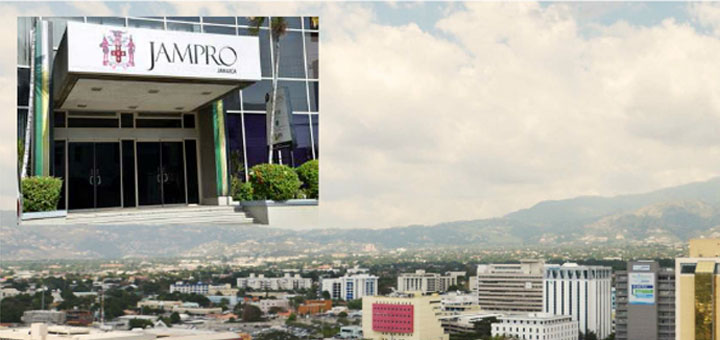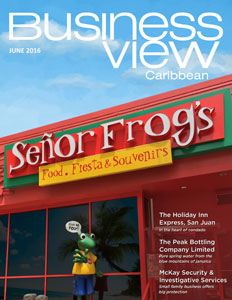JAMPRO
Jamaica means business
Business View Caribbean profiles JAMPRO , an agency of Jamaica’s Ministry of Economic Growth and Job Creation. Head office in Kingston, Jamaica.
The Jamaica Promotions Corporation (JAMPRO) is an agency of Jamaica’s Ministry of Economic Growth and Job Creation. The Agency is charged with promoting business opportunities in export and investment to the local and international private sector.
Explaining JAMPRO’s role in Jamaica’s economy, President Diane Edwards said JAMPRO was created to be “The country’s primary facilitator of foreign direct investment into private sector projects that are in need of investment capital. Our mission is to internationalize Jamaican businesses in order to improve their performance and their penetration in international markets. A major part of our mandate is also to facilitate foreign direct investments coming into the country.”
The organization was created in 1988 as a result of a strategic merger of three entities – the Jamaica National Investment Promotion, the Jamaica Industrial Development Corporation, and the Jamaica National Export Corporation. Edwards explains, “JAMPRO’s mission was to build on the focuses of those three organizations – investment attraction, export promotion, and industrial development, and that remains, to this day, the mission of JAMPRO. Our vision is to operate as a catalyst for wealth creation, and to enhance the quality of life for Jamaicans.”
Today, a staff of 90 at JAMPRO is focused in three lead divisions. The Investment Promotion Division’s focus is to attract and facilitate investment. “And that means that we go out into international markets, target specific companies, and convince those companies to invest in Jamaica,” says Edwards. “We have two overseas offices that help us do this – one in Toronto and one in London – and they both cover large geographic areas. Their mission is to find investors in the specific sectors that we have identified where Jamaica has a competitive advantage.” Those sectors, according to Edwards, are tourism & agribusiness; knowledge services, including BPO, or Business Process Outsourcing (Jamaica currently has 18,000 BPO workers); manufacturing, mining, and energy; and logistics.
“We’re the first port-of-call for marketing information,” Edwards adds. “We advise on the business environment, the legislation, the regulations, the international treaties, taxation – all the things that an investor needs to know. JAMPRO provides ‘hand-holding’ support to investors, accelerating the time it takes to set up businesses and helping to overcome some of the barriers they face in maneuvering the Jamaican business processes.”
JAMPRO’s Export and Market Development Division is focused on helping Jamaican exporters find new export markets as well exploit those undersupplied markets already identified. It organizes trade missions, promotes trade exhibition participation, and connects exporters with international buyers. It also provides market intelligence that helps exporters understand global market trends.
In addition, the Division assists exporters with what is referred to as “capacity building” – the process by which people, organizations, and society systematically stimulate and develop their capability over time to achieve social and economic goals, through improvement of knowledge, skills, systems, and institutions.
“On the export side,” says Edwards, “we are focused on fresh produce, processed food, manufacturing, mining, and creative industries. We identify companies in those sectors and do an assessment of capacity and abilities to penetrate international markets. Once we have done this analysis, then we tailor-make assistance programs to their needs.”
“For instance, one of the programs we have is called ‘Export Max,’” Edwards continues. “That program selects a small number of companies to give them in-depth assistance over a two- to three-year period. That assistance can mean ideas and support for product enhancement, product adaptation, changing packaging labeling and size – really adapting the product to make it more suitable to international market trends. There is also a mentoring component within this program, which encourages larger companies to help smaller ones.”
JAMPRO also developed a National Export Strategy, which examined different sectors of the economy, and provided a roadmap for Jamaica to increase exports in those sectors. “If you look at produce, for instance, we’ve identified markets for sweet potato, yam, for melons, and other fresh fruits. We work with associations like the Fresh Produce Consortium out of the UK, to ensure that our local farmers are meeting international specifications,” says Edwards. “We expect to see a big expansion in that area in 2016,” she adds. “If you look at limestone – we have very pure limestone in Jamaica – and are currently shipping to places as far away as Chile; we are making cement out of the limestone, locally, and that cement has penetrated most of the region.”
Edwards stresses that the two Divisions – Investment and Export – work in tandem. “If you look at coffee and cocoa, these are areas where we’re not producing enough. Although we have very fine quality products, we’re not producing enough to satisfy the demand in the international market. So, these are areas where we are encouraging investment to expand into export. There is a very strong link between the export and investment divisions, because a lot of what we do as a country would require investment to facilitate growth.”
JAMPRO’s third Division, Corporate Development and Competitiveness, evaluates the business environment and how it can be improved and modernized to make doing business easier for the private sector. Edwards explains the Division’s importance to JAMPRO’s collaboration with other government bodies: “We liaise with various government agencies and ministries to improve legislation, and, in many cases, enact new legislation. For example, there are some new industries that we are targeting, such as medical tourism, cannabis, and time share, for instance, that needed changes in legislation to be enacted. We look at how we can create legislation and the right policy environment to attract investments into those industries.”
The Division also looks at the international rankings of Jamaica’s performance with a series of international reports such as the Global Competitiveness Report, the Doing Business Report of the World Bank, and various indices, such as the Logistics Performance Index. JAMPRO directly targets the components of those indices to see how Jamaica can improve its ranking, internationally.
In order to fulfill its mission with its vast range of stakeholders, JAMPRO regularly collaborates with organizations whose own missions are closely aligned, including the Jamaica Exporters Association (JEA) and the Jamaica Chamber of Commerce (JCC), among others. Because it reports to the Ministry of Economic Growth and Job Creation, it also has weekly meetings with the Minister and his team.
“In addition,” says Edwards, “we have what is called the National Competitiveness Council, which is chaired by the Minister. And that Council really brings together a wide range of government agencies which are all involved with the upgrade of the business environment. We coordinate our efforts so that we all operate in sync on business-related matters.”
As Jamaica sits at the doorway to the newly expanded Panama Canal, it has been preparing for the possibility of becoming the fourth node of the global logistics framework, joining Rotterdam, Dubai, and Singapore. Key to that initiative is investment in the country’s infrastructure as it relates to logistics – the ability to get product to market quickly and efficiently.
“Logistics is one of the critical areas of focus for JAMPRO,” Edwards states. “We have a department that is focused on logistics and attracting investments in this area, and we have made huge strides in this effort. For instance, there is a private company called Kingston Wharves that is developing its own logistics center on the private side of the wharf and has attracted quite a number of transshipment companies to operate through their enhanced facility. In addition, there is the public side of the wharf which was called Kingston Container Terminal, and which is now called Kingston/Freeport Terminal. That has been privatized through a concession agreement to CMA-CGM (a worldwide leading container shipping company) and Terminal Link (a port operator). In addition, we have interest from international companies in dry-docking, in ship provisioning, and in developing an LNG hub in Jamaica.
“We are also privatizing the airport in Kingston; and the airport in Montego Bay has already been privatized, so you really will have quick connectivity between the port, the airport, and the road network. We have done significant work in upgrading the road network in Jamaica to the point where we now have proper, modern highways that allow connections between the different points in the country.
“Logistics is going to permeate the Jamaican economy. It’s not just going to be about one particular place. We’re developing a whole complex of infrastructure and various components that go into building out this fourth node of the international or global logistics framework.”
JAMPRO considers itself the ambassador of the Jamaican brand and is continually focused on promoting investment and export opportunities in order to grow the country’s economy and enhance the life of its citizens. JAMPRO wants the world to know that “Jamaica means business.”
Check out this handpicked feature on the Ministry of Finance and the Public Service, Jamaica.
AT A GLANCE
WHO: JAMPRO
WHAT: An agency of Jamaica’s Ministry of Economic Growth and Job Creation
WHERE: Head office in Kingston, Jamaica
WEBSITE: www.jamaicatradeandinvest.org/nassau




 This information will never be shared to third parties
This information will never be shared to third parties